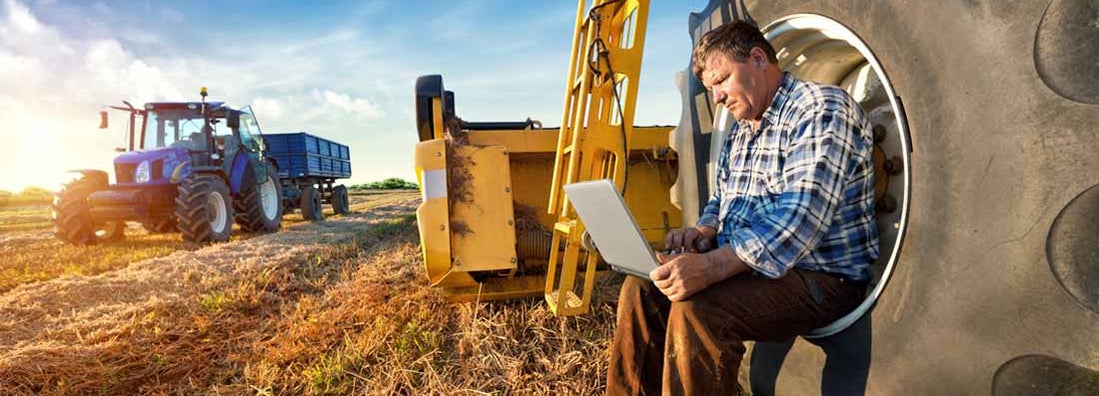Farm Insurance Cost
(Understanding the costs and all the factors that go into deciding what you pay to protect your home and business)

Candace Jenkins is a licensed insurance advisor with over a decade of experience. She is also a writer and loves to write on all things insurance. Candace writes for TrustedChoice.com on a continuous basis and is here with the facts about all your insurance inquiries.

If you have an agribusiness, you may already know that the cost of insurance can be a bit pricey. So how do you find the right cost without sacrificing your coverage? After all, your farm isn't just your business, it's also your home and your livelihood. An independent insurance agent can help.
Your independent insurance agent is one of the greatest assets you can have in your corner. They can help shop multiple farm insurance carriers to find the perfect coverage options for you. They'll walk you through all the ins and outs of the quotes they bring to you and help you understand how your costs are factored and how to get the best price for you and your business. But first, here's a little background to help you understand the costs of your insurance policy.
The Cost of Farm Insurance Coverage
No two farms are alike, so when it comes to estimating the cost of farm insurance, there's really no way to give you an accurate figure. Every farm will have different needs, and those needs determine the amount of coverage your farm should have in place. However, there are some risk factors that could cause your premiums to up or down depending on what your farm's specifics are.
Farm premium determining risk factors:
- Claims: Have you had prior farm claims? If so, your farm policy will most likely put a surcharge on your farm insurance to account for the loss for up to five years.
- Inventory: What does your farm have in stock? How many seeds, crops, livestock, herds, poultry and so on do you have that would need to be replaced if a major loss occurred? The more you have, the more the premium.
- Equipment and machinery: What pieces of equipment and machinery does your farm have and what are they worth? The more money they cost, you can assume the higher they are to insure.
- Farmhouse: What does your farmhouse look like? Is it old or new? It is big or small? Is it updated with the finest furnishings or does it have a lackluster appeal? The fancier your farmhouse is, the more it may cost to replace.
- Pole barns and other structures: What is your barn situation? How big is your barn? How many barns do you have? What are they constructed of?
All of these items will determine your pricing and are handy to know off the bat so you can get an accurate quote from your independent insurance agent.
What Does Farm Insurance Cover?
There are all different types of insurance for everything you own, run, and drive in, and farm insurance is no different. The coverages you need all depend on the size and scope of your farm, your operations, employees, residential status, and more.
Common included farm coverages:
- Farmhouse: Your agribusiness policy is a two in one, meaning it covers both your personal items like your farmhouse, and your business items like your tractor or livestock.
- Livestock: Your livestock would have coverage for injury or death if, for example, your cattle got attacked by a coyote or got caught in a barbed wire fence.
- Crops: Your crops have coverage as well against bad weather that may wipe out your product. Some may even have coverage for pests.
- Equipment and machinery: You'll need coverage for all your tractors and farm equipment in order to do the heavy lifting, so be sure you include them on your policy.
- Barns and other structures: Most farms have barns or other structures to store equipment and livestock. This is something that is typically included with your policy.
Extra farm coverages worth considering:
Some extra coverages that could be purchased will depend entirely on your farm's specifics and needs. But just to give a few examples, see below.
- Windmill coverage: There is coverage for these giant energy propellers, but would only apply if you actually had a windmill on your property.
- Silo coverage: Some farmers have them for storing crops like wheat and barely, but unless you actually have a silo then the coverage would be kind of pointless.
- Bee coverage: Not protection from bee stings, it's protection for your bees. If you operate a honey-producing, beekeeping farm, then coverage for those little guys and the sweet nectar they produce is a must.
And on the business side:
- Loss of business income coverage: This protects you if there’s some sort of business interruption, replacing lost income and providing operating expenses to keep you grinding away.
- Workers' compensation coverage: This protects your workers and employees from medical expenses due to sickness, injury, or worse as the result of a job-related accident. WARNING: Every state has different guidelines and requirements, so talk to your agent about the requirements in your state.
- Commercial vehicle coverage: This protects the big rigs, transport trucks, and trailers that you have to run your business.
- Commercial umbrella coverage: This extends the coverage limits of liability claims beyond your standard farm policy's limits. If you have a lot of visitors on your farm or your products end up in a large number of houses and restaurants, it's a good idea to increase your liability coverage with an umbrella policy.
Important Farm Insurance Premium Discounts
Getting a discount on your farm insurance all depends on a number of things, but especially on the carrier you choose. Some of the common discounts that may apply include:
- Multi-policy discount: This is for those farmers who couple multiple lines of insurance with the same carrier thus giving them a discount for doing business all in one place.
- Government subsidies: There are some federal subsidies when it comes to Multiple Peril Crop Insurance. Since some of these programs are federally regulated, they chip in a portion.
- Safety measures: You'll get brownie points for taking a risk assessment on your farm and making sure you are being cautious with preventative measures to avoid claims. It's all about being proactive.
- Claim free and longevity: The longer you go without filing a claim on your farm insurance, the better the rates will become. It's also true that the longer you are with anyone carrier, the more discounts they allot you overtime for loyalty.
As always, have a chat with your independent insurance agent on coverages and how some of these discounts may apply. Your insurance company could have other offerings that you are unaware of as well.
The Benefits of an Independent Insurance Agent
Independent insurance agents have access to multiple insurance companies, ultimately finding you the best coverage, accessibility, and competitive pricing while working for you. And as your farm grows and your needs change, they'll be there to help you adjust your coverage, up or down, to make sure you're properly protected without overpaying. Find an independent insurance agent in your community here.
https://www.statista.com/statistics/723015/volume-of-insured-acres-of-farmland-usa-by-crop/
https://www.statista.com/statistics/649391/total-value-crop-insurance-premiums-paid-by-farmers-in-usa-by-state/